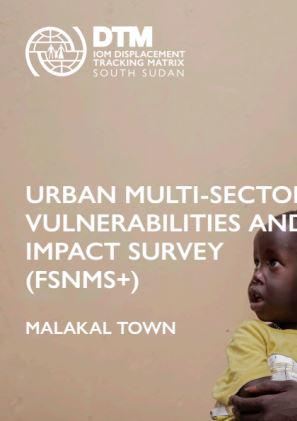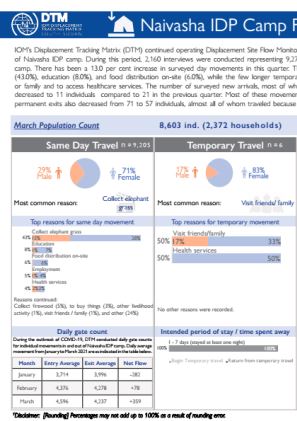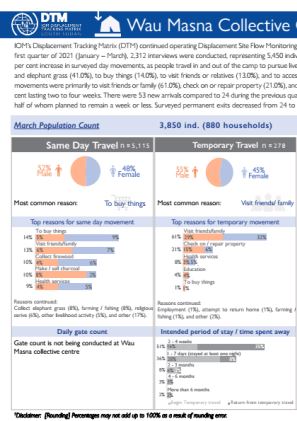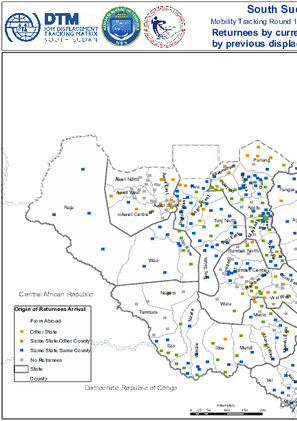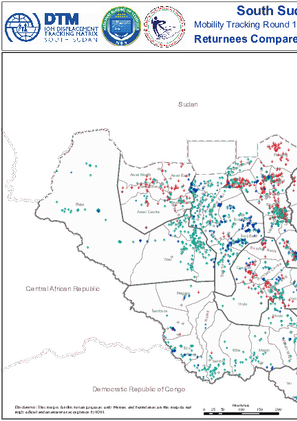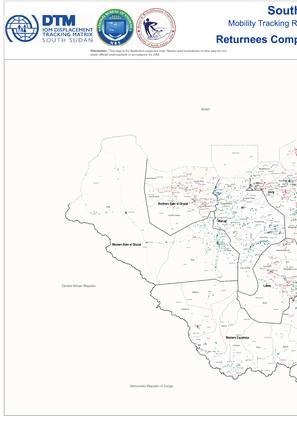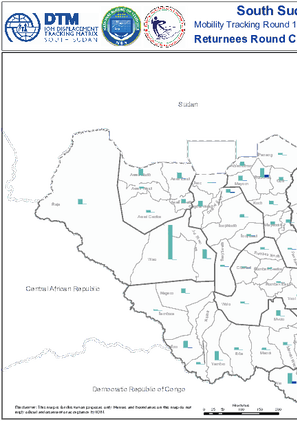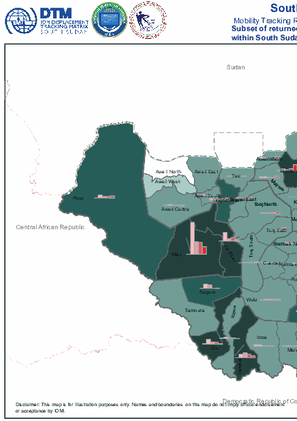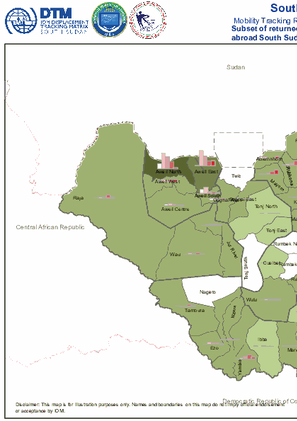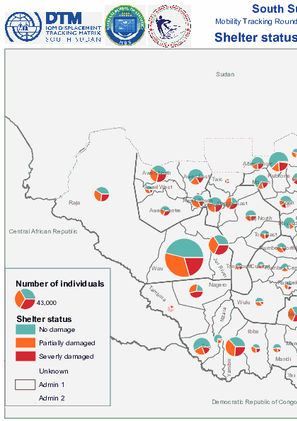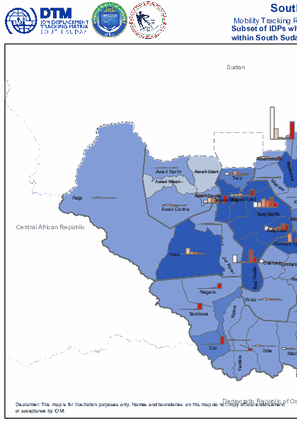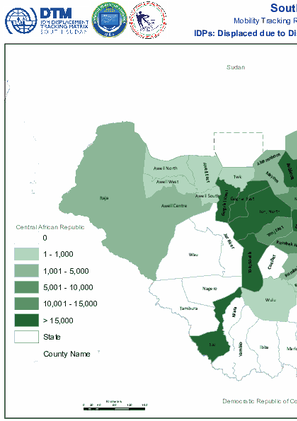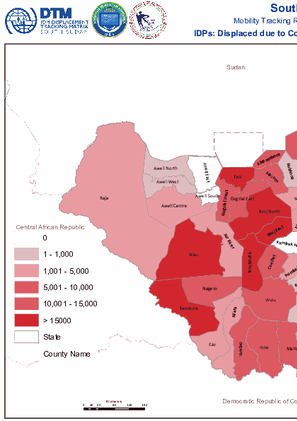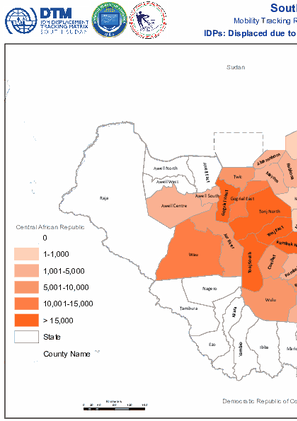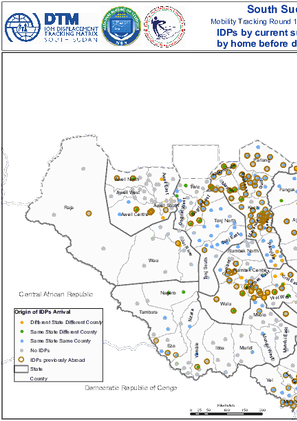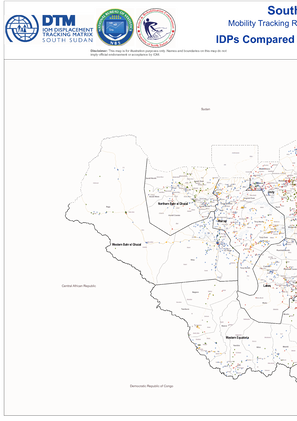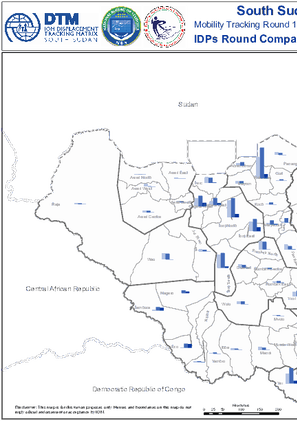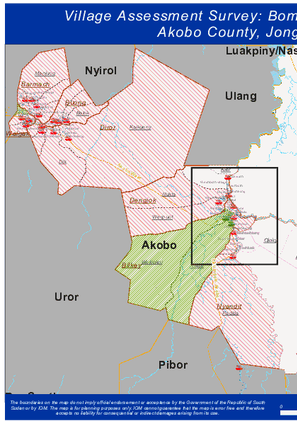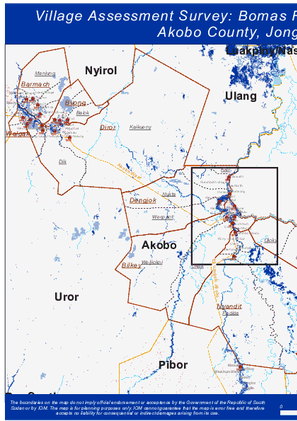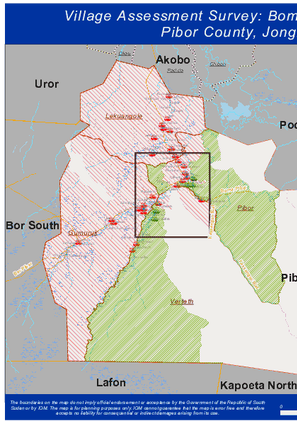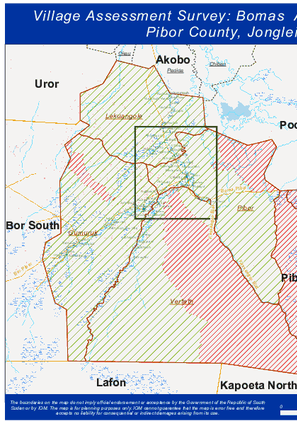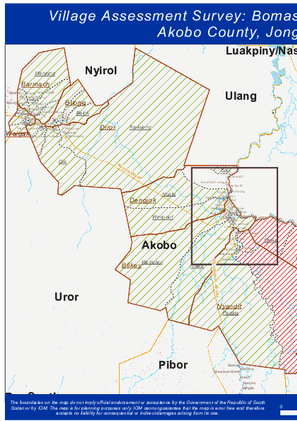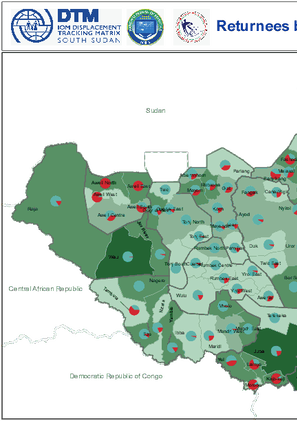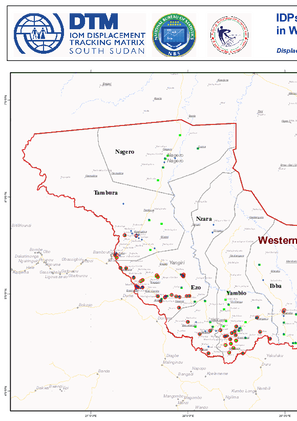-
Countries
-
Data and Analysis
-
Special Focus
-
Crisis Responses
South Sudan
South Sudan
IDPs tracked
Displacement Movements
1,475,000
IDMC 2022
Data collection round
About South Sudan
Conflict and instability in South Sudan have resulted in large-scale internal and cross-border displacement since the December 2013 crisis of over 4 million individuals. In September 2018, the Revitalized Agreement for the Resolution of the Conflict in South Sudan (R-ARCSS) was signed between the major warring parties. Whilst overall there have been improvements in security since and returns are ongoing, fighting and communal clashes (frequently linked to cattle raiding) continue to trigger new displacements and the situation remains volatile.
DTM South Sudan’s toolbox is designed to meet critical information gaps during all phases of response, from preparedness, to intervention and transition/recovery. DTM South Sudan provides country-wide figures on the numbers, locations and priority needs of IDPs and returnees updated on a quarterly and ad-hoc basis. The programme undertakes biometric registration in selected parts of the country to support partners with reaching intended beneficiaries during distributions. Flow monitoring data is collected on a daily basis at displacement sites, key transit hubs and border crossing points to identify mobility dynamics of migrants including IPDs and returnees. Through ad hoc surveys, headcounts, infrastructure/service mapping exercises and other assessments, DTM provides additional information to support partners in planning their response.
Contact
IOM South Sudan DTM Juba
ISSDTM@iom.int
Current Donors
- Switzerland
- Japan
- DFID
- ECHO
- OCHA
- OFDA
- Canada (DFATD)
- WFP
- UN Peacebuilding Fund
- World Bank
South Sudan — Population count: Bentiu IDP Camp (June 2021)
DTM conducts regular population counts to monitor population dynamics and displacement trends.
South Sudan — Population count: Naivasha IDP Camp And Masna Collective Center (June 2021)
In June 2021, the monthly population count was conducted at Masna Collective Centre where 2,732 individuals / 740 households were identified and Naivasha IDP Camp where 8,413 individuals / 2,286 households were counted.
South Sudan — Malakal PoC Brief (September 2021)
The Malakal PoC site was born out of the civil war that started in South Sudan on 15 December 2013. At the time, civilians were fleeing from indiscriminate and deliberate attacks and their only place of refuge was the UNMISS Base in Malakal.
Sep 15 2021
South Sudan — Malakal PoC Brief (September 2021)
South Sudan — Mobility Tracking Round 10 Atlas
This atlas contains a summary of findings form the tenth round of Mobility Tracking conducted across South Sudan through key-informant based assessment at payam and location level between November and December 2020.
Sep 08 2021
South Sudan — Mobility Tracking Round 10 Atlas
South Sudan — IDP Site Multi-Sector Needs, Vulnerabilities and COVID-19 Impact Survey (FSNMS+) — Malakal UNMISS PoC Site (November - December 2020)
During the second half of 2020, the International Organization for Migration’s Displacement Tracking Matrix (IOM DTM) and the World Food Programme’s Vulnerability Analysis and Mapping (WFP VAM) units undertook a joint household-level assessment of selected urban areas and camps for internally dis
South Sudan — IDP Site Multi-Sector Needs, Vulnerabilities and COVID-19 Impact Survey (FSNMS+) — Bentiu IDP Camp (October - November 2020)
During the second half of 2020, the International Organization for Migration’s Displacement Tracking Matrix (IOM DTM) and the World Food Programme’s Vulnerability Analysis and Mapping (WFP VAM) units undertook a joint household-level assessment of selected urban areas and camps for internally dis
South Sudan — IDP Site Multi-Sector Needs, Vulnerabilities and COVID-19 Impact Survey (FSNMS+) — Wau Naivasha IDP Camp (October - November 2020)
During the second half of 2020, the International Organization for Migration’s Displacement Tracking Matrix (IOM DTM) and the World Food Programme’s Vulnerability Analysis and Mapping (WFP VAM) units undertook a joint household-level assessment of selected urban areas and camps for internally dis
South Sudan — IDP Site Multi-Sector Needs, Vulnerabilities and COVID-19 Impact Survey (FSNMS+) — Juba IDP Camps 1 & 3 (October - November 2020)
During the second half of 2020, the International Organization for Migration’s Displacement Tracking Matrix (IOM DTM) and the World Food Programme’s Vulnerability Analysis and Mapping (WFP VAM) units undertook a joint household-level assessment of selected urban areas and camps for internally dis
South Sudan — Urban Multi-Sector Needs, Vulnerabilities and COVID-19 Impact Survey (FSNMS+) — Malakal Town (December 2020 - January 2021)
During the second half of 2020, the International Organization for Migration’s Displacement Tracking Matrix (IOM DTM) and the World Food Programme’s Vulnerability Analysis and Mapping (WFP VAM) units undertook a joint household-level assessment of selected urban areas and camps for internally dis
South Sudan — Urban Multi-Sector Needs, Vulnerabilities and COVID-19 Impact Survey (FSNMS+) — Bentiu / Rubkona Town (November - December 2020)
During the second half of 2020, the International Organization for Migration’s Displacement Tracking Matrix (IOM DTM) and the World Food Programme’s Vulnerability Analysis and Mapping (WFP VAM) units undertook a joint household-level assessment of selected urban areas and camps for internally dis
South Sudan — Urban Multi-Sector Needs, Vulnerabilities and COVID-19 Impact Survey (FSNMS+) — Wau Town (October - November 2020)
During the second half of 2020, the International Organization for Migration’s Displacement Tracking Matrix (IOM DTM) and the World Food Programme’s Vulnerability Analysis and Mapping (WFP VAM) units undertook a joint household-level assessment of selected urban areas and camps for internally dis
South Sudan — Flow Monitoring Dashboard (May 2021)
DTM’s Flow Monitoring Registry (FMR) surveys people on the move at key transit points within South Sudan (SSD) and at its borders.
South Sudan — Mobility Tracking Round 10 Initial Findings
This summary presents initial findings from the tenth round of Mobility Tracking conducted across South Sudan through key-informant based assessment at payam and location level between November and December 2020.
South Sudan — Event Tracking (January - June 2021)
IOM's Displacement Tracking Matrix conducts a country-wide Mobility Tracking exercise in regular intervals to update a comprehensive IDP and returnee baseline.
South Sudan — Flow Monitoring Dashboard (April 2021)
DTM’s Flow Monitoring Registry (FMR) surveys people on the move at key transit points within South Sudan (SSD) and at its borders.
South Sudan — Flow Monitoring Dashboard (March 2021)
DTM’s Flow Monitoring Registry (FMR) surveys people on the move at key transit points within South Sudan (SSD) and at its borders.
South Sudan — Biometric registration update: Bor IDP Camp (December 2020)
The International Organization for Migration (IOM) Displacement Tracking Matrix (DTM) team in South Sudan maintains biometric registration database in Bor IDP Camp.
South Sudan — Biometric registration update: Naivasha IDP Camp (December 2020)
The International Organization for Migration (IOM) Displacement Tracking Matrix (DTM) team in South Sudan maintains biometric registration database in Naivasha IDP Camp.
South Sudan — Biometric registration update: Bentiu IDP Camp (December 2020)
The International Organization for Migration (IOM) Displacement Tracking Matrix (DTM) team in South Sudan maintains biometric registration database in Bentiu IDP Camp (previously Protection of Civilian Site - PoC).
South Sudan — Biometric registration update: Malakal PoC Site (December 2020)
The international Organization for Migration’s (IOM) Displacement Tracking Matrix (DTM) team in South Sudan maintains biometric registration database in Malakal Protection of Civilian Site (PoC).
South Sudan — Biometric registration update: Juba IDP Camps (December 2020)
The International Organization for Migration (IOM) Displacement Tracking Matrix (DTM) team in South Sudan maintains biometric registration database in both Juba IDP Camp 1 and Juba IDP Camp 3.
South Sudan — Malakal PoC Displacement Site Flow Monitoring (January - March 2021)
IOM’s Displacement Tracking Matrix (DTM) continued operating Displacement Site Flow Monitoring (DSFM) at the gates of Malakal Protection of Civilians (PoC) site. During this period, 3,073 interviews were conducted representing 4,544 individual movements in to and out of the site.
South Sudan — Wau Naivasha Displacement Site Flow Monitoring (January - March 2021)
IOM’s Displacement Tracking Matrix (DTM) continued operating Displacement Site Flow Monitoring (DSFM) at the main entry and exit points of Naivasha IDP camp. During this period, 2,160 interviews were conducted representing 9,279 individual movements in to and out of the camp.
South Sudan — Wau Masna Displacement Site Flow Monitoring (January - March 2021)
IOM’s Displacement Tracking Matrix (DTM) continued operating Displacement Site Flow Monitoring (DSFM) at Wau Masna Collective Centre. In the first quarter of 2021 (January – March), 2,312 interviews were conducted, representing 5,450 individual movements.
Pagination
South Sudan — Site Assessment - Round 4
2018-12-31
A site assessment is a sub-component of mobility tracking. It aims to collect data on population presence, living conditions and needs in a particular displacement site or community.
South Sudan - Baseline Assessment - Full Dataset - Round 4
2018-12-31
A baseline assessment is a sub-component of mobility tracking. It aims to collect data on IDP, migrant or returnee population presence in a defined administrative area of the country.
South Sudan - Baseline Assessment Round 2
2018-06-30
A baseline assessment is a sub-component of mobility tracking. It aims to collect data on IDP, migrant or returnee population presence in a defined administrative area of the country.
South Sudan - Baseline Assessment Round 1
2018-03-31
A baseline assessment is a sub-component of mobility tracking. It aims to collect data on IDP, migrant or returnee population presence in a defined administrative area of the country.
South Sudan Dataset - BMR Summary from Jan_2016 to Dec_2017
2017-12-31
A baseline assessment is a sub-component of mobility tracking. It aims to collect data on IDP, migrant or returnee population presence in a defined administrative area of the country.
Pagination
- First page
- Previous page
- 1
- 2
- 3
- 4
- 5
- 6
South Sudan - Mobility Tracking Round 11 - Returnees by Current Payams and Homes of Origin (September 2021)
This map shows the payams returnees are currently in. Where returnees' origin states and counties are different to those of their currently mapped location, this is indicated (Mobility Tracking Round 11, September 2021).
South Sudan - Mobility Tracking Round 11 - Returnee Count Changes by Location (September 2021)
This map shows the direction of change in the number of returnees as mapped by round eleven of Mobility Tracking, at the location level (Mobility Tracking Round 11, September 2021).
South Sudan - Mobility Tracking Round 11 - Returnee Count Changes by Location - detailed (September 2021)
This map compared the locations of returnees that were mapped during round eleven of Mobility Tracking, as compared to the locations that were mapped in the previous Mobility Tracking Round 10 (Mobility Tracking Round 11, September 2021).
South Sudan - Mobility Tracking Round 11 - Returnee Round Numbers Compared by County (September 2021)
This map compares the number of returnees as assessed in different rounds of Mobility Tracking, at the county level (Mobility Tracking Round 11, September 2021).
South Sudan - Mobility Tracking Round 11 - Arrivals of Returnees from within South Sudan at the County Level (September 2021)
This map displays the subset of returnees who arrived at their counties from within South Sudan, by period of arrival (Mobility Tracking Round 11, September 2021).
South Sudan - Mobility Tracking Round 11 - Arrivals of Returnees from Abroad at the County Level (September 2021)
This map displays the subset of returnees who arrived at their counties in South Sudan from abroad, by period of arrival (Mobility Tracking Round 11, September 2021).
South Sudan - Mobility Tracking Round 11 - Shelter Status of Returnees by County (September 2021)
This map displays the shelter status of returnees, as well as their numbers, at the county level (Mobility Tracking Round 11, September 2021).
South Sudan - Mobility Tracking Round 11 - Arrivals of IDPs from within South Sudan at the County Level (September 2021)
This map displays the subset of IDPs who arrived at their counties from within South Sudan, by period of arrival (Mobility Tracking Round 11, September 2021).
South Sudan - Mobility Tracking Round 11 - IDPs Displaced Due to Disasters by County (September 2021)
This map displays the numbers of IDPs who have been displaced by natural disasters at the county level (Mobility Tracking Round 11, September 2021).
South Sudan - Mobility Tracking Round 11 - IDPs Displaced Due to Conflict by County (September 2021)
This map displays the numbers of IDPs who have been displaced by conflict at the county level (Mobility Tracking Round 11, September 2021).
South Sudan - Mobility Tracking Round 11 - IDPs Displaced Due to Clashes by County (September 2021)
This map displays the numbers of IDPs who have been displaced by communal clashes at the county level (Mobility Tracking Round 11, September 2021).
South Sudan - Mobility Tracking Round 11 - IDPs by Current Payams and Homes of Origin (September 2021)
This map shows the payams IDPs are currently in. Where IDPs' origin states and counties are different to those of their currently mapped location, this is indicated (Mobility Tracking Round 11, September 2021).
South Sudan - Mobility Tracking Round 11 - IDPs Count Changes by Location (September 2021)
This map shows the direction of change in the number of IDPs as mapped by round eleven of Mobility Tracking, at the location level (Mobility Tracking Round 11, September 2021).
South Sudan - Mobility Tracking Round 11 - IDP Count Changes by Location - detailed (September 2021)
This map compared the locations of IDPs that were mapped during round eleven of Mobility Tracking, as compared to the locations that were mapped in the previous Mobility Tracking Round 10 (Mobility Tracking Round 11, September 2021).
South Sudan - Mobility Tracking Round 11 - IDP Round Numbers Compared by County (September 2021)
This map compares the number of IDPs as assessed in different rounds of Mobility Tracking, at the county level (Mobility Tracking Round 11, September 2021).
South Sudan - Mobility Tracking Round 11 - Arrivals of IDPs from Abroad at the County Level (September 2021)
This map displays the subset of IDPs who arrived at their counties in South Sudan from abroad, by period of arrival (Mobility Tracking Round 11, September 2021).










